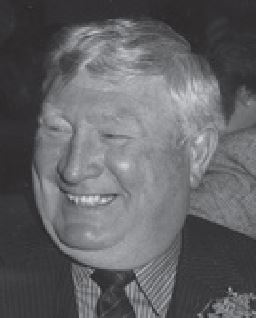Shortly after the amalgamation of the 4th and 8th Hussars in 1958, Billy McLernon entered the new Corporals’ Mess for the first time and challenged any member who had been a 4th Hussar to a fight to establish, as he saw it, some sort of pecking order in which, naturally, former 8th Hussars would be in the ascendancy.

Mac McGibbon took up the gauntlet and the two fought to an honourable draw, becoming fast friends for 20 years. And that rather sums up Billy: quick to challenge, afraid of no one or anything and the most steadfast of friends in good times and bad.
The occasion also instilled in him a deep love and fierce pride in the Queen’s Royal Irish Hussars which never left him.
After a not entirely incident-free period in the North Irish Horse, Billy joined the 8th Hussars in Luneburg in January 1957, marrying Bridie in the same year. He never made a wiser move than proposing to Bridie who remained the rock-bed of his life for the next 48 years.
They produced four children, including a son Keith, who in due course joined the regiment and Ruth and Bridget who both married Irish Hussars – in Bridget’s case twice as her first husband was tragically killed in Cyprus.
Billy worked his way up the ranks, specialising in Driving and Maintenance, a trade at which he became a School Instructor. In Sharjah in 1961, he narrowly escaped serious retribution when he was responsible for a troop of donkeys joining ‘C’ Squadron’s morning parade under the disbelieving (and unamused) eyes of Maj John Paley.
After service in Malaysia, he was posted to Bovington before rejoining the Regiment in Wolfenbuttel. Remaining at regimental duty for the remainder of his career, he became a staff-sergeant troop leader in ‘C’ Squadron in Paderborn before being promoted to SSM of ‘B’ Squadron and, in the fullness of time, to RSM under Cols Brian Kenny and Dick Webster.
It would be difficult to imagine two more different commanding officers but Billy managed them both to such a successful extent that, at the end of his eventful regime, he was offered, and accepted a commission. No man slipped into a tent hat and green suit with greater aplomb as he made a seemingly effortless transition from near god to junior officer.
In Tidworth in the late seventies he was MTO and remained so on the regimental move to Münster until, on promotion, he became HQ Squadron Leader, a command he held until his retirement from the Army in the regiment’s tercentenary year.
Never a man to look back, he took up the reins of his family’s pub, The North Irish Horse, at Dervock, a village in Co Antrim of which he then took positive charge.
His fundraising ability for various community projects became legendary for war memorial and the transfer of Remembrance Day services out of sectarian churches and into the eucominical atmosphere of his all-denomination creation. He was justly proud of this and his other work in Dervock which continues to serve the community so well.
His huge funeral procession wound its way round the village. Bringing traffic to a standstill and filling the church to overflowing. His son-in-law, George Black, delivered a moving eulogy and the craic afterwards was a party of which Billy would certainly have approved.


